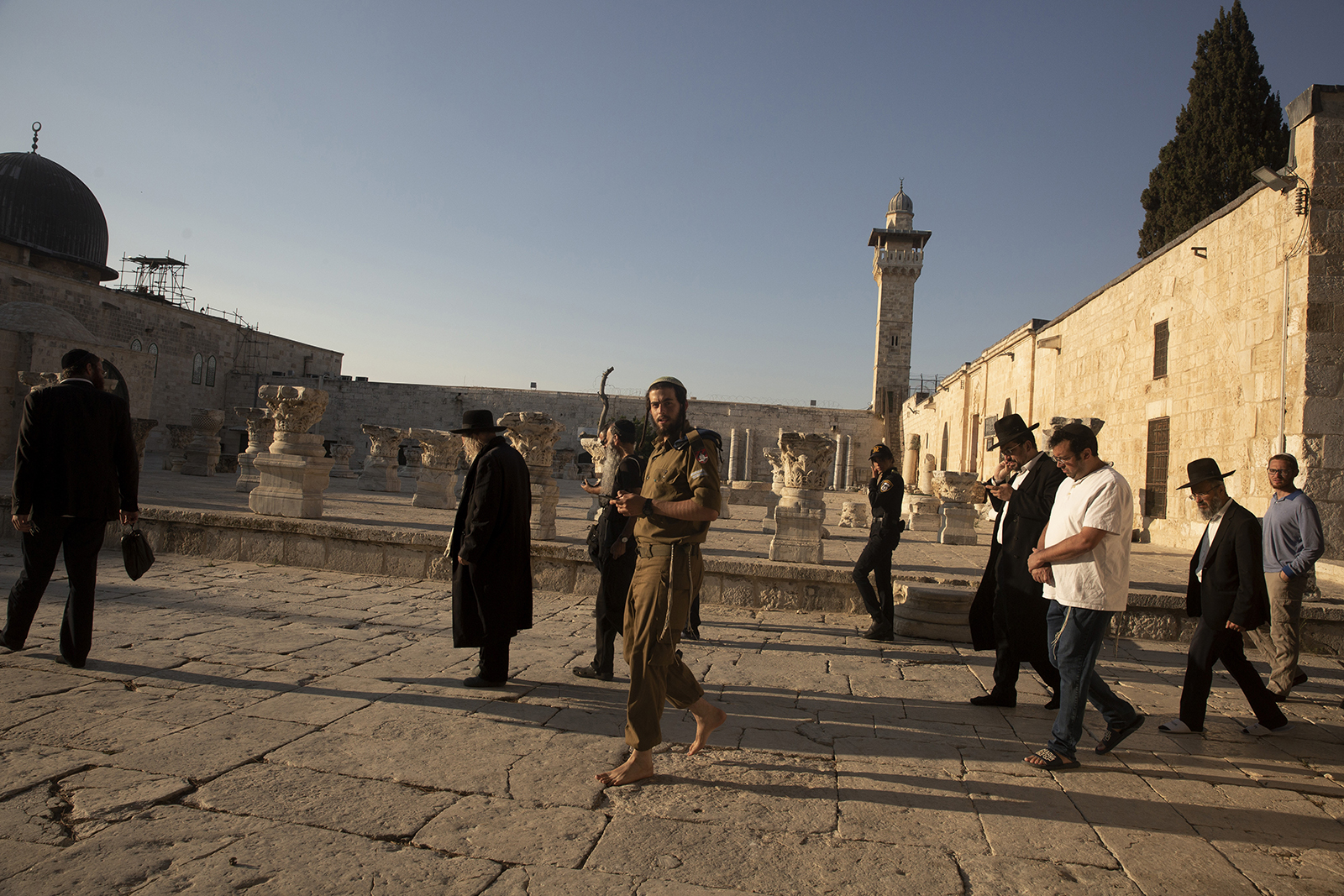
JERUSALEM (RNS) — Israel’s minister of national security dreams of building a synagogue on the Temple Mount, where the ancient Jewish temples once stood.
But the site, which Muslims call Haram al-Sharif, is now the home of the Al-Aqsa Mosque, the third holiest site in Islam. Muslims believe that the Prophet Muhammad ascended to heaven from the site.
“If I could do what I wanted, a synagogue would also be established on the Temple Mount,” Itamar Ben-Gvir, the outspoken minister of national security and a far-right religious nationalist, told Israel’s Army Radio on Monday (Aug. 26).
Previously, on visits to the contested site, Ben-Gvir has called the mount “the most important place in Israel” and stated, “Our policy is to enable Jewish prayer.”
The minister’s latest remarks have sparked outrage from Muslim authorities, concern from the U.S. State Department, and Israeli assurances that the holy site’s long-standing religious “status quo” won’t be violated.
Assurances by Prime Minister Benjamin Netanyahu that there would be no change in the status quo at the site have not eased tensions.

Israel’s far-right National Security Minister Itamar Ben-Gvir, center, flanked by his security detail, approaches the entrance to Jerusalem’s most sensitive holy site, the Temple Mount, in Jerusalem’s Old City, Aug. 13, 2024. (AP Photo/Ohad Zwigenberg)
Ben-Gvir’s statement also raised an uncomfortable question: Why should Israel, the only Jewish-majority country in the world, be expected to ban Jews from praying at their holiest site while permitting Muslims to pray there?
What is known as the religious status quo at the site are a series of agreements that have evolved over the centuries.
Under the Ottoman Empire (1515 to 1917), Muslim claims to the Temple Mount included the Western Wall, the last vestige of the second Jewish temple. When the British ruled Palestine from 1920 to1948, they maintained exclusive Muslim rights to the mount but allowed Jews to pray at the Western Wall.
Jordan, which ruled East Jerusalem and the West Bank from 1948 to 1967, broke the existing status quo by denying Jews any access to their holy sites and destroying synagogues.
When Israel captured East Jerusalem from Jordan in 1967, it agreed to allow the Wakf, a Jordanian Muslim authority, to continue to administer the mount but not the Western Wall area. Israel would oversee security matters on the mount.

Religious Jews arrive to pray at the Temple Mount, known to Muslims as the Noble Sanctuary, in the Old City of Jerusalem, Aug. 2, 2021. Jewish prayers at Jerusalem’s most sensitive holy site, known to Jews as the Temple Mount and to Muslims as the Noble Sanctuary, were once unthinkable. But they have quietly become the norm in recent years, defying long-standing convention, straining a delicate status quo and raising fears that they could trigger a new wave of violence in the Middle East. (AP Photo/Maya Alleruzzo)
According to that agreement, “anybody can visit the Temple Mount but only Muslims can pray there,” said Rabbi David Rosen, an Israeli expert in interreligious affairs.
Consequently, whenever Ben-Gvir leads a group of Jews to the mount to pray out loud, they are violating the status quo between Israel and the Jordanian Wakf, Rosen said. Muslims consider such visits a provocation.
The Palestinian Ministry of Foreign Affairs said it viewed Ben-Gvir’s statements as “an explicit and blatant call to demolish the mosque and construct the so-called Temple in its place.”
Hamas, in a statement Monday, said Ben-Gvir’s comments reflect “the true intentions of the occupation regime towards Al-Aqsa and its Arab and Islamic identity, as well as its criminal steps aimed at Judaizing it and tightening control over it.”
Israel’s Chief Rabbinate also opposes any change to the status quo, a view reiterated by chief rabbis, both Ashkenazi and Sephardi, Rosen said.
Some other rabbis have, in recent years, argued that prayer may be allowed in certain areas. Jewish visits to the Temple Mount have increased in the past year to roughly 50,000, up from a few thousand in previous years.
Yisrael Medad, a longtime advocate for Jewish prayer on the Temple Mount, said the frenzy over Ben-Gvir’s comments amounts to fearmongering:
“Ben-Gvir said, ‘I cannot give permission to build a synagogue but if I could, I would,’” Medad said. “He admits he is limited. He’s just verbalizing a hope.”
The yearning to rebuild the destroyed temples is at the very heart of Jewish faith and practice, Medad said.
“You have the Tisha B’Av fast, which memorializes the destruction of the temple. Three times a day an Orthodox Jew prays that the temple will be rebuilt. At every Jewish wedding a glass is broken because the temple was destroyed. Rebuilding the temple is not an idea from outer space.”
Furthermore, Medad said, it is hypocritical to demand that Israel allow people of every faith to pray at their holy sites while forbidding Jews to pray at their holiest site.
“There is a law in Israel ensuring free access for all faiths. We want to be like every other Muslim, Christian and Jew.”
For now, Ben-Gvir’s comments have drawn rebuke from other government ministers as well as from the U.S. State Department and Arab countries in the Middle East.
Any attempts to build a synagogue on the mount “would demonstrate blatant disregard for the historic status quo with respect to the holy sites in Jerusalem,” State Department spokesman Matthew Miller said.
Added Yoav Gallant, Israel’s defense minister, in a post on X: “Challenging the status quo on the Temple Mount is a dangerous, unnecessary and irresponsible act. Ben-Gvir’s actions endanger the national security of the State of Israel and its international status.”
Two Orthodox Jewish newspapers in Israel, Yated Ne’eman and Haderech, also condemned Ben-Gvir’s statements.
Source link




